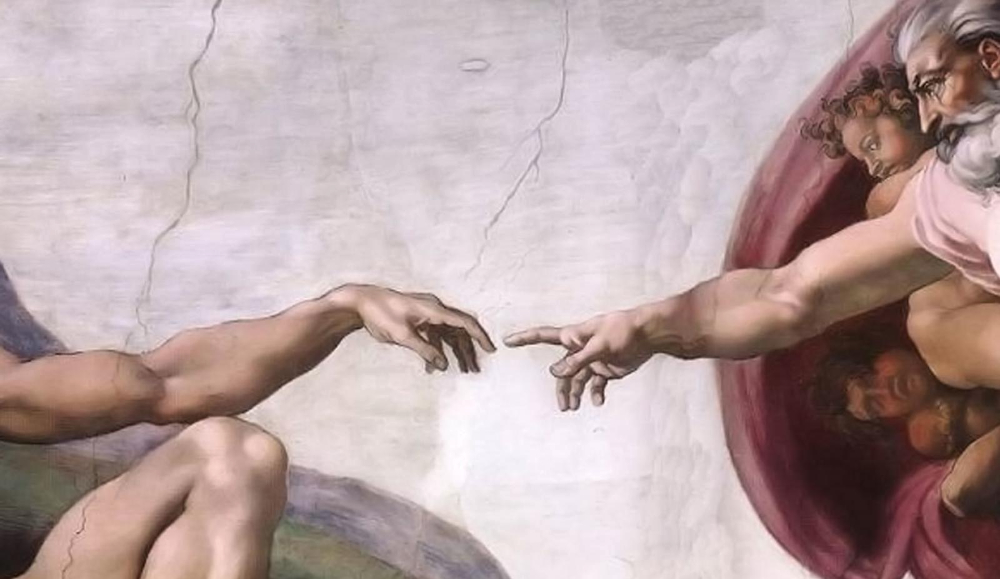
Psalm 127:1 "Unless the LORD builds the house, those who build it labor in vain. Unless the LORD watches over the city, the watchman stays awake in vain."
This one's a little more philosophical; ontological, to be precise. This Psalm starts off with a very typical theological argument, everything is dependent on God; but the more you consider this argument the more profound it gets, because there's a glitch in the Matrix:
The Psalmist is looking at human action, particularly collaborative action, the best kind. The builders are plural, the watchman is watching over a city of many people. They are collaborating to make a better, and a safer future. They are doing what we call "good". The Psalmist argues that no matter how grand their plans, how complete their resources, or how pure their motives, it's all in vain unless God aids the building and the protecting, and the most important thing God adds is eternal meaning.
Let's say that everything the humanists claim they want actually happens: We manage somehow to create a limitless, clean energy source and we distribute it affordably over the entire world. We solve poverty, disease, war, and every form of oppression. We find a way to destroy greed and to distribute wealth equitably. Mankind reaches a beautiful equilibrium with the universe and with themselves... So what? What's the point of an elegant solution and an altruistic motive when it's all going to disappear in the end?
Think about describing any achievement or wonder (in either the good or the bad extremes) to the most cynical man in the world. He responds with “so what?”. So you tell them why this is thing is remarkable, and he responds with "so what?". This goes on for a bit, but then you realise that no matter how many times you give an answer to “so what?” the same response can be given right back, and the cynic would not be wrong. And in the greatest piece of irony the cynic himself will say abouth being right, "so what?".
The reason why the cynic will always have the "so what?" final word is that in a few million years (a drop in the bucket of even Earth time) the sun will burn itself out consuming the Earth with it; and even if Earth's sentience manage to survive long enough to leave this solar system, at some point the whole universe will end, all matter will revert to energy. There are a handful of theories floating around about how that will happen. But it will happen.
So then what's the point of any achievement at all? In the end nothing is remarkable if there is no one left to remark. Why do we celebrate great talent or recoil at horror? At some point it will all disappear and no one will be around to remember it, to celebrate it, mourn it, learn from it, wonder at it. Even from an evolutionary perspective what is the ultimate point of species survival? If all we have to be grateful for is ancestors and resources, neither of which have any awareness of our gratitude, what's the point of gratitude? Surely everything we call beautiful, good, kind, brave, brilliant is of no greater value than what we call ugly, bad, cruel, cowardly, and stupid.
Some will say, "well we have now, and we have each other." But that is no answer to "so what?" because even that does that ultimately mean anything.
The only possible end to the “so what?” cycle is to answer with infinite meaning, and the only possible infinite meaning can be found in the combination of The Eternal and The Relational.
Essentially without an eternal person outside of space and time, absolutely nothing has any real meaning. And, as if to confirm these suspicions, we know that this universe had a beginning which, at the very least, implies a beginner. Not only so, not only must this eternal person exist, but this eternal person must also be perfectly good, there is no other way to ascribe good and bad to anything. I've heard the evolutionary arguments for morality, I find them utterly unconvincing even for temporal goals, let alone eternal ones.
Now what I mean by “absolutely nothing has any real meaning” is precisely that. Without an eternal person the only meaning we can ascribe is at best sentiment.
This is why it matters what we do when no one else is watching, because someone always is. Brushing things under the carpet is perfectly fine for temporal beings, but it will never do for eternal ones. Hebrews 11:6 "whoever would draw near to God must believe that he exists and that he rewards those who seek him."
The teacher has the final word to the "so what?" loop: Ecclesiastes 12:13–14 "The end of the matter; all has been heard. Fear God and keep his commandments, for this is the whole duty of man. For God will bring every deed into judgment, with every secret thing, whether good or evil."
